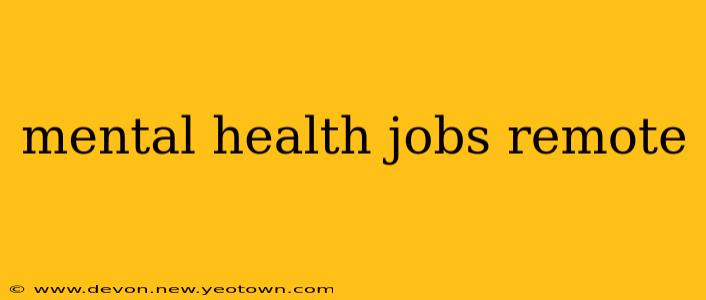The world of mental health is undergoing a quiet revolution, and it's happening online. More and more people are seeking therapy and mental health support remotely, opening up exciting opportunities for professionals in the field. If you're a compassionate, skilled mental health professional looking for flexibility and work-life balance, a remote position might be the perfect fit. This journey into the world of remote mental health jobs will explore the various options available, the skills you need, and the challenges you might face. Let's dive in!
What Types of Remote Mental Health Jobs Are Available?
The options are surprisingly diverse! It's not just about traditional therapy sessions. Think about the broad range of support needed – from individual counseling to group therapy, from crisis intervention to case management. Let's explore some specific roles:
Licensed Therapist/Counselor: This is the most common remote mental health job. You'll provide individual or group therapy sessions via video conferencing platforms like Zoom or telehealth systems. Specializations like trauma therapy, anxiety treatment, or addiction counseling are highly sought after.
Psychiatric Nurse Practitioner (PMHN): PMHNPs can diagnose and treat mental health conditions, prescribe medication, and provide therapy. Remote work for PMHNPs involves telehealth consultations and managing patients' medication plans remotely.
Social Worker: Remote social workers offer case management, crisis intervention, and support services to clients. They may work with individuals, families, or communities, providing guidance and resources through virtual platforms.
Peer Support Specialist: These roles involve providing emotional support and guidance to individuals with similar mental health experiences. Remote work allows for connecting with clients across geographical boundaries.
Mental Health Case Manager: This role focuses on coordinating care for individuals with complex mental health needs. Remote case management uses technology to track progress, schedule appointments, and connect clients with resources.
What Skills Do I Need for a Remote Mental Health Job?
Beyond your core clinical skills, success in remote mental health work requires specific competencies:
-
Technology Proficiency: You'll need to be comfortable using video conferencing platforms, electronic health records (EHRs), and telehealth systems. Technical troubleshooting skills are a plus!
-
Strong Communication Skills: Nonverbal cues are harder to read remotely. Excellent communication skills, empathy, and the ability to build rapport virtually are crucial.
-
Self-Discipline and Organization: Working remotely requires self-motivation and the ability to manage your time effectively. Creating a structured work environment is essential.
-
Privacy and Confidentiality: Protecting patient data is paramount. A deep understanding of HIPAA regulations and the ability to maintain secure online practices is vital.
How Do I Find Remote Mental Health Jobs?
The job hunt for remote mental health positions can be rewarding. Here's how you can find the right opportunities:
-
Online Job Boards: Websites like Indeed, LinkedIn, and specialized healthcare job boards often list remote mental health positions.
-
Company Websites: Many telehealth companies and mental health organizations actively recruit remote clinicians. Check their career pages directly.
-
Professional Networking: Connect with other mental health professionals online and at conferences (even virtual ones!). Networking can lead to valuable job leads and insights.
What Are the Challenges of Remote Mental Health Work?
While remote work offers flexibility, there are challenges to consider:
-
Technological Issues: Internet outages or software glitches can disrupt sessions. Having a backup plan is essential.
-
Maintaining Boundaries: Blurring the lines between work and personal life can be a risk. Establishing clear work boundaries is crucial.
-
Managing Client Emergencies: Having a clear protocol for handling emergencies remotely is vital. Knowing when and how to escalate concerns to in-person services is critical.
Is Working Remotely Right for Me?
Working remotely in mental health isn't for everyone. It requires a unique blend of clinical skills and technological adaptability. Consider your personality, work style, and technical capabilities to determine if it's the right path for you.
This exploration of remote mental health jobs provides a starting point. The field is constantly evolving, offering exciting possibilities for those committed to delivering quality mental healthcare in a flexible and innovative way. Remember to research licensing requirements and stay updated on industry best practices. Good luck on your journey!

